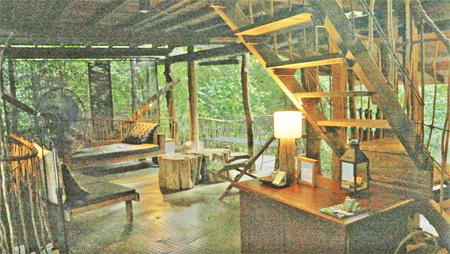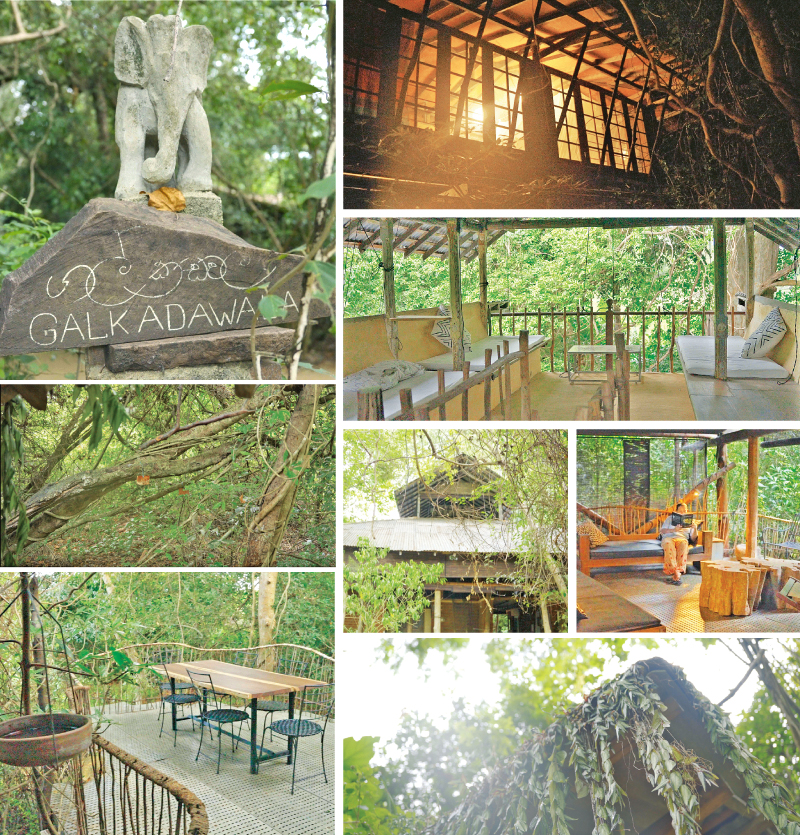 Nestled in the heart of Sri Lanka, Galkadawala Forest Lodge stands as a shining example of sustainable and ecological tourism, embodying a harmonious blend of nature preservation and authentic hospitality. Mauli de Saram, the visionary behind this eco-centric haven, shares insights into her pioneering initiative during an interview with Sunday Observer. At Galkadawala, where 161 bird species, 49 butterfly species, and 22 mammal species flourish within the lush surroundings of an agricultural village bordered by paddy fields, lakes, and forests, the lodge presents a picturesque landscape for nature enthusiasts and photographers alike.
Nestled in the heart of Sri Lanka, Galkadawala Forest Lodge stands as a shining example of sustainable and ecological tourism, embodying a harmonious blend of nature preservation and authentic hospitality. Mauli de Saram, the visionary behind this eco-centric haven, shares insights into her pioneering initiative during an interview with Sunday Observer. At Galkadawala, where 161 bird species, 49 butterfly species, and 22 mammal species flourish within the lush surroundings of an agricultural village bordered by paddy fields, lakes, and forests, the lodge presents a picturesque landscape for nature enthusiasts and photographers alike.
Recognised for its commitment to sustainability, Galkadawala garnered international acclaim in 2024, with prestigious travel publications such as ‘The Standard’ ranking it among the top 12 eco-friendly destinations worldwide. Through its eco-conscious practices and dedication to preserving the natural beauty of its surroundings, Galkadawala Forest Lodge exemplifies a transformative model for sustainable tourism, setting a high standard for responsible travel in Sri Lanka and beyond.
Nature’s calling
 Speaking to the Sunday Observer Mauli de Saram, explains the inspirations behind the sustainable journey of the lodge in a reflective tone. Recalling idyllic memories from childhood spent immersed in the untamed wilderness near Peradeniya University, Mauli reminisces, “We lived in the furthest corner of the Peradeniya town…living with the trees, other animals, it gave me a sense of belonging to the forest.” Despite initially following a corporate path in merchandising, Mauli’s roots in nature beckoned strongly. Drawn back to the simplicity and harmony of forest life, Mauli found parallels between the corporate world’s challenges and the decisions required for sustainable living, culminating in the realisation of a long-held dream at Galkadawala.
Speaking to the Sunday Observer Mauli de Saram, explains the inspirations behind the sustainable journey of the lodge in a reflective tone. Recalling idyllic memories from childhood spent immersed in the untamed wilderness near Peradeniya University, Mauli reminisces, “We lived in the furthest corner of the Peradeniya town…living with the trees, other animals, it gave me a sense of belonging to the forest.” Despite initially following a corporate path in merchandising, Mauli’s roots in nature beckoned strongly. Drawn back to the simplicity and harmony of forest life, Mauli found parallels between the corporate world’s challenges and the decisions required for sustainable living, culminating in the realisation of a long-held dream at Galkadawala.
Eco-conscious design
The architectural essence of the Galkadawala Forest Lodge, meticulously designed by architect Vijitha Basnayaka in collaboration with owner Mauli, is rooted in a philosophy of moderation and sustainable living. Reflecting on the genesis of this architectural journey, Mauli credits Vijitha’s unwavering belief in moderation as the key to harmonious living, stating, “Moderation is what is most important for us to live.” This deliberate shift towards moderate living, as opposed to strict minimalism, is not only practical but also aligns with Sri Lankan values of living simply. Embracing a gradual and mindful approach, Vijitha’s design ethos emphasizes the use of reused building materials, such as doors, windows, and timber sourced from old structures, embodying a commitment to sustainability. By utilising pre-used materials for 80% of the lodge’s construction, the architectural process echoes a deeper intention to consume less and tread lightly on the environment. This approach, as Mauli notes, fosters a sense of contentment and well-being through reducing excessive wants and needs, encapsulating the lodge’s ethos of living in harmony with nature.
In the realm of sustainable practices at the Galkadawala Forest Lodge, Mauli shares profound insights on the symbiotic relationship between human consumption and nature’s preservation. Reflecting on the ethos of reciprocity with the environment, Mauli underscores the imperative of balancing take and give back to nature, stating, “We do consume from nature…but we have to think twice in everything we do.” This mindful ethos extends to practical choices like moderating electricity use and valuing water resources, resonating with a learned lifestyle of resourcefulness passed down from previous generations. Embracing the natural abundance of the tropical setting, where air conditioning is deemed unnecessary due to a lush canopy of trees nurtured through reforestation, Mauli explains, “Nature needs a chance to get back into its own feed.” By reclaiming and restoring a four-acre tract once marred by chain cultivation, Galkadawala blooms with over 600 indigenous trees, a testament to Mauli’s steadfast commitment to environmental stewardship. Upholding a philosophy of moderate consumption across all facets of daily living, from energy to clothing, the lodge actively supports reforestation initiatives through the donation of hundreds of saplings annually, symbolising a cycle of replenishment and gratitude towards nature’s bounties. Through these collective efforts, Galkadawala embodies Mauli’s personal ethos of reciprocity, encapsulating a holistic vision of sustainability and regeneration in action. “I personally believe that giving back to nature through planting trees is deeply fulfilling. It brings me great satisfaction to witness individuals coming to collect these plants from us and then replanting them elsewhere. Last year alone, we distributed 800 plants in this manner,” she added.
Sustainable tourism
In the tapestry of Galkadawala’s sustainable ethos, Mauli sheds light on the integration of nature preservation within the local community. Rooted in a culture of sustainability and the principle of living in moderation to minimise waste, Mauli observes, “Our culture is based on sustainability…that the less wastage.”
While the villagers naturally lead a modest existence, the challenge lies in translating this inherent sustainability into action within their work environment. Despite hurdles such as balancing work commitments with environmental consciousness, the community’s receptiveness to sustainable practices becomes evident as they adapt and expand their awareness. Drawing on the village’s agricultural heritage, Galkadawala sources some supplies locally, particularly vegetables from the Habarana area and homegrown organic rice. Collaborating with a neighboring villager in rice cultivation, Mauli gains a profound appreciation for the intricacies of food production, acknowledging,
“Some of our supplies are sourced from the village, primarily from the Habarana area where we purchase our vegetables. As for rice, we grow our own organic indigenous rice, which we use for our meals. I collabourate with a villager from the neighbouring village in this rice cultivation endeavor. This partnership has been incredibly rewarding, as I have gained valuable insights and knowledge from working alongside him. It has truly been an eye-opening experience for me to understand the meticulous process involved in bringing a plate of rice to our table. While rice may seem like a simple staple, the dedicated efforts and labor behind its production are truly remarkable and should never be underestimated.”
Embracing her farming roots alongside the village community, Mauli finds immense satisfaction in cultivating a symbiotic relationship with nature and learning from the agricultural practices that have shaped her upbringing.
In crafting a unique and authentic experience, Mauli shares insights into the specialised clientele the lodge attracts, catering to individuals seeking a deep connection with nature and a commitment to sustainable living. In Mauli’s quest to carve out a niche market focused on sustainability since 2006, she discovered a clientele that resonates with the ethos of living in harmony with nature. Drawing in predominantly European guests looking to escape the urban hustle and rediscover serenity in the embrace of lush greenery, Galkadawala offers a retreat from the stresses of modern living.
Mauli said, “Especially Europeans, they love this greenery…the sounds of the forest…it’s quite a contrast to the sounds you hear in the city.” Embracing the allure of simplicity and mindful consumption, Galkadawala embodies a lifestyle of moderation that resonates deeply with guests seeking an authentic and transformative experience. Amidst a growing trend towards sustainability, Mauli underscores the intrinsic Sri Lankan way of life as a beacon for mindful living, drawing visitors not just to the lodge but to the sustainable essence of the island itself.
Ecotourism empowerment
The lodge’s profound impact lies in challenging guests to reimagine their lifestyles through the lens of sustainability, fostering a harmonious coexistence with nature that leaves a lasting impression and cultivates a deeper appreciation for mindful living practices.
In illuminating the intersection of sustainability and Sri Lanka’s tourism landscape, Mauli underscores the inherent sustainability ingrained in the country’s societal fabric. While acknowledging areas for improvement, such as reducing polythene consumption, Mauli highlights the prevalent vegan-centric culinary culture as a testament to Sri Lanka’s sustainable ethos. Embracing a lifestyle rooted in moderation and vegan principles, Sri Lanka exemplifies sustainable living practices that can serve as a beacon for eco-conscious tourism.
“In our daily lives at home, including how we eat and the quality of our food, we predominantly follow a vegan diet. Around 80 percent of our meals are vegan, unless meat or fish is specifically requested. For other dishes or curries, we avoid using animal fats or milk, relying instead on coconut-based ingredients. This emphasis on plant-based cuisine aligns with vegan principles. We cater to our guests accordingly, ensuring that our offerings resonate with their preferences. The next step for us is to effectively market this aspect of our sustainability practices, showcasing our commitment to living in moderation and promoting our vegan-friendly approach to dining,” she added.
With an emphasis on small-scale accommodations and homestays, which contribute substantially to the economy, Mauli emphasizes the pivotal role these local businesses play in driving tourism revenue. Mauli envisions a shift in the tourism narrative towards promoting and marketing these grassroots enterprises, empowering individuals to run home-based accommodations as a means of economic stability and resilience.
“In Sri Lanka, there are approximately 400,000 homes offering homestay accommodations, and these properties are consistently booked. Interestingly, these small-scale operations generate a significant portion of tourism revenue, accounting for about 75% of the total influx of money into the country.
These home-based businesses, known as small and medium accommodations, play a crucial role in the tourism sector. It is essential to prioritise marketing and promoting these establishments more effectively, as they offer guests an authentic and personalised experience. By highlighting these opportunities, individuals have the chance to operate their own home business, hosting guests and earning additional income. This setup is particularly beneficial for women looking to balance family responsibilities while generating extra revenue by hosting a few guests in their home.” Mauli added.
By fostering a culture of self-sustainability and promoting community-driven tourism initiatives, Mauli advocates for a transformative approach that can positively impact the broader Sri Lankan economy, offering a pathway to economic empowerment and resilience in the face of unforeseen challenges like the impact of the Covid – 19 pandemic and other disruptions.








